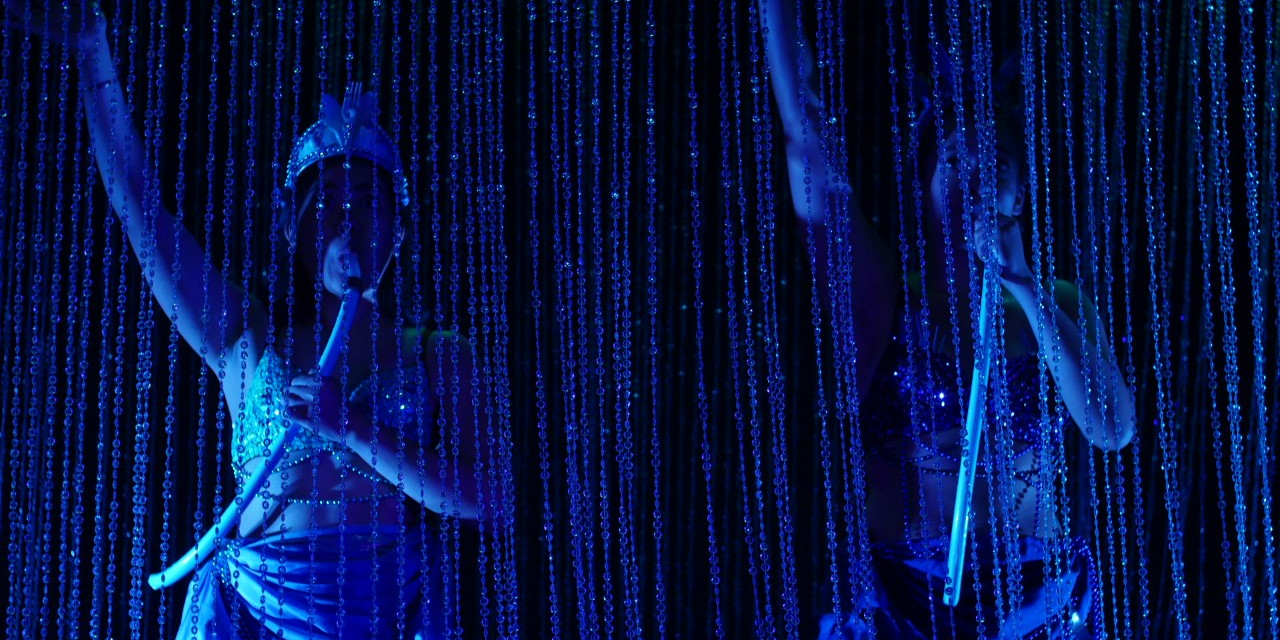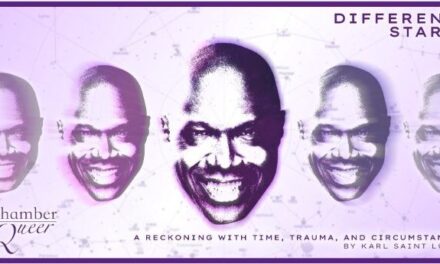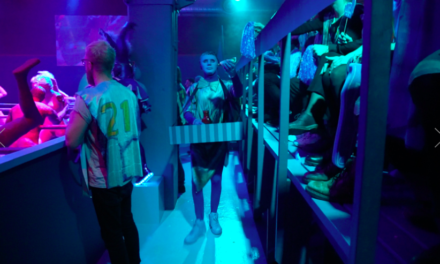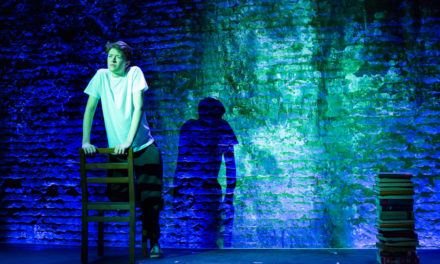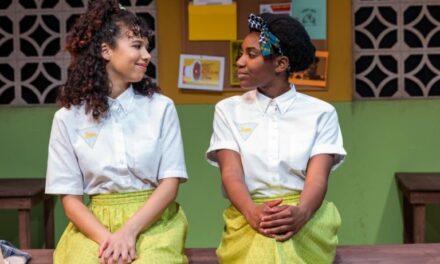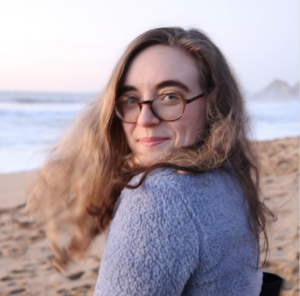
Portrait of Anya Richkind, Photo by Jess Honovich
Anya Richkind is an emerging Brooklyn-based playwright who has taken many different roles in theatrical arts since she was little. She has written many experimental theatrical creations that are across various genres and styles. Richkind graduated from Yale with a B.A. in playwriting, queer history, and Eastern European culture in 2016, and through her fruitful artistic career, she has been selected to be a finalist in the Eugene O’Neill Theater Center’s National Playwrights Conference, Leah Ryan’s Fund for Emerging Women Writers, Cutting Ball Theater’s Variety Pack Series, and a semi-finalist in the Bay Area Playwrights Festival. Her work has been put on stage at the Corkscrew Theater Festival, The Barrow Group Theatre, Yale College, The New School for Drama, The American Conservatory Theater’s Young Conservatory, Marin Country Day School and The Tank.
*The following portion of the interview has been edited
Ziming Jim Liu: Here’s a cliché question that I have to ask: What made you get into theatre and what made you become a playwright?
Anya Richkind: In terms of getting into theatre, I think I just always loved it. My first theatrical experience was at my temple, I’m Jewish, and we were doing a Purim Spiel, like the story of Purim, and I was acting as Queen Vashti, and I think I was four years old, and I just loved it. I really enjoyed performing. Then I started taking acting classes. I guess it really started with performing. I always really enjoyed being a performer and everyone watching me […]. I did not super get into playwriting until later in high school. I wanted to take this acting class, and it was full. I basically was in protest and was like “I’m going to make my own theatre class,” but you can’t do an acting class with just one person, so I’m going to make a playwriting class. So I read a lot of plays and started writing. And then in college about halfway through, I wasn’t sure if I wanted to keep acting in plays, people are really good at it, and it’s really hard to be that empathetic for a crowd of people. I could challenge myself more and be a better theatre maker if I was writing rather than performing. […] This is my path to playwriting. I am obsessed with actors, I love actors, but I am not one of them anymore.
ZJL: I notice that you have been an actor and receiving actor trainings at a young age, such as your experience with American Conservatory Theatre, Yale Repertory Theater, and The Viola Question (a renowned improv-comedy group) when you were in Yale (all 4 years, in fact). How have these experiences affected your artistic endeavors, especially your career as a playwright?
AR: […]I really want to write plays that actors enjoy acting in, because from being on the other side, basically from my childhood and formative years, I definitely had things I liked to act out. I always want the actors to feel safe, empowered, and excited to perform my words, not any other type of way. The other way that impacted my writing is that I don’t really feel like I’m writing. It feels more like I’m hearing people acting things out, and I am just writing things down, rather than creating the dialogue and describing it. It doesn’t feel like writing an essay or anything like that, it feels much more close to “oh yeah, this is how people act things out.” I did a lot of improv in college, so a lot of writing to me feels like just doing a one-person improv scene that I’m writing down basically. But I think the main thing is wanting to create work that actors are interested in bringing to life rather than a chore […] I wanted to see people acting it out, giving people that opportunity. I guess my writing is not completely grounded in reality. I don’t want people to know whether it’s real or not. It often comes from a place where I think “that would be cool to see!” Who knows if it is successful or not? But that is what it keeps coming back to.
[…] I think it [improv] is really fun and it definitely helps me as a writer. In improv, there are no wrong answers, you just have to try something, and that is definitely how I try to make myself feel when I’m writing. Unlike in improv, you can always come back and change it. You have to just go with it and give it a shot.
ZJL: Both of your comedic (e.g. The End of Mermaids and Big Happy Days) and dramatic (e.g. Ministers of Loneliness and Here Lies Cappy) plays explore the boundaries of experimental theatre in different degrees and aspects. Some may argue that some of your plays can be categorized into science fiction, dark comedy, and political satire. What inspires you to create artistic content like these?
AR: That’s what I am the most curious about—The space between “what is actually happening in reality” and “whatever it is you are feeling emotionally.” I feel that can be represented when we have an opportunity, as people come into the theatre, like suspension of disbelief, they come in ready and willing to go with whatever you show them. I want to invite people to expand what they are thinking about beyond just what is physically happening and more about if your emotion and your feelings were manifested and became physical, what they would look like. Sometimes that looks like people turning into a twig, or spirits from the past coming and talking to you. I try really hard to listen to my instincts when I’m writing, and my instincts just turn out to be not strictly grounded to reality […] I don’t exactly know why. There are probably some reasons from my childhood. It always comes back to me […] In terms of how people talk to each other (when I’m writing), It’s always very natural and naturalistic, I combine naturalistic dialogues with these bizarre and supernatural worlds. People still speak in a normal way, they say “um” and stuff like that, but they are in these otherworldly situations sometimes.
I think it is intentional, to your question. It’s something that is interesting and exciting. I see so many plays I get bored in, and sometimes I’m just like “let’s make something weird happen so it’s not boring anymore!” Who knows if that actually works or not, but it’s coming from a place where I get bored in plays that are just people talking in their house, I’m like, “can we do something here?” There are enough of these plays, and they are great. But let’s make some weird ones.
ZJL: All your plays have been inspiring discussions on many current and relatable topics for audiences from all different backgrounds, such as feminism, queerness (Everyone Is Gay, The End of Mermaids, and tender of you too), suicide (Here Lies Cappy), family (Here Lies Cappy), and loneliness (The Secret of Asteraceae, Ministers of Loneliness). Is this your intention and what are your views on contemporary theatre raising awareness to, stimulating discussions for, affecting, and changing important current social issues?
AR: I thought this question was really interesting. I genuinely just write about what I think is interesting and I want to write about. It’s really pretty selfish. I’m pretty fascinated by queerness, and I’m pretty fascinated by women, so I’m going to write about that. I haven’t thought about it before as I actually do tend to write about things that are interesting issues. I’m glad you pointed it out, I should probably talk about it that way, too […] I always think the more personal, the more vulnerable, the more honest I can be in my writing, the more interesting, the more engaging it will be for those experiencing it. I try to excavate my own life and my own experiences as personally as possible. It might give other people who are watching or acting in it some feeling of catharsis or some feeling of relief. That’s always my goal—to shed a light on something I’m feeling or I’m confused about, or I’m saddened by. I really write about it from a selfish point of view, like this is how I’m dealing with it. With the play Here Lies Cappy, which is about my grandmother’s suicide, that was genuine because I was like “I don’t really know how to wrap my head around this.” She’s someone I never met because she passed away when my mom was really young. It was this weird thing between me and my mom because we never talked about it either because she barely knew her. She was so young when her mom died. I just wrote the play to deal with that confusion […] I genuinely believe when you are vulnerable and honest with yourself, it genuinely helps other people feel some kind of catharsis, too. The “write about what you know,” I don’t think that has to be things that you literally experience, but just whatever’s been bugging you, whatever you are obsessed with, or whatever you can’t figure out if you write about that, it does have larger societal implications. Because we are all confused, we are all confused by how to be a person and how to be yourself. It’s hard. I guess I don’t intentionally try to have these conversations about larger themes, but I think the more vulnerable you try to make yourself, the more so you open yourself up to be a larger conversation.
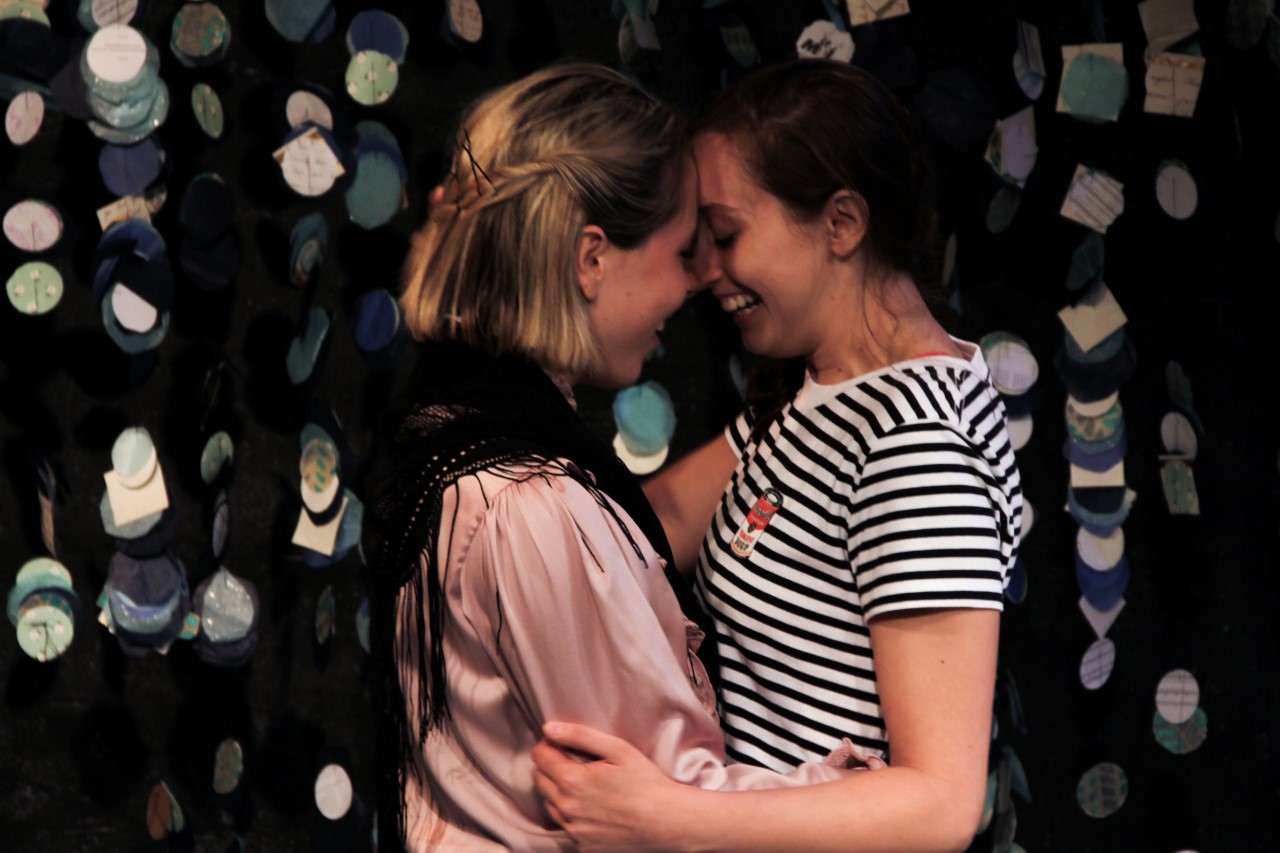
Regan Moro and Frankie Placidi (actors) in a tender of you too, photo taken by Lindsey Mercer
ZJL: So do you think vulnerability is something you actively explore?
AR: Yes definitely. I think that is what I love about theatre the most. Partially because […] actual audience members are actually showing up there and actual performers are on stage. It’s an incredibly intimate experience. I think the film is really powerful in different ways because there aren’t actual people out there. You have an opportunity to show people and take them to a completely different environment—you can show them Antarctica and stuff like that, (a cough) but what’s so special about theatre is that things like that (referring to the cough), an actor will cough. They are on stage being a real person, you are bearing witness to that humanity. So I think theatre is a lot about vulnerability. […] What I like to watch the most is when I feel “Wow, we all just got really personal and shared some very intimate details about ourselves.” That’s when I feel some kind of catharsis.
I also think it’s kind of sad. I think about this a lot. What’s so beautiful and sad about theatre is that you do feel that closeness and the play ends, and you go back to your normal life. [You have] this strange memory of we all were in this room together for a while, feeling something and it just ends and you are done? That is what also keeps me coming back—the contradictory nature of theatre, how there’s so much opportunity for closeness and vulnerability. But also you know the actors are performing, they bow at the end to tell you, “this is a show!” I am really fascinated by that contradiction of seeking vulnerability, but knowing it’s an act, but maybe that’s ok. This is one of my big life questions. I don’t think there’s an answer to it. This is another thing that keeps me writing for theatre.
ZJL: So would you say the feeling is still one of the keys for your theatrical works?
AR: Totally. I always think about what’s actually theatrical, what is something you don’t expect to see on stage—let’s try to do that! What makes people feel “this is kind of uncomfortable”—let’s do that! One of my main goals is just to not make boring plays […].
ZJL: For your bachelor’s degree, you graduated 2016 from Yale with a B.A. in many versatile and diverse areas—Playwriting, Queer History, and Eastern European culture. How has this experience shaped you as a person and your career, and what advice do you have for aspiring theatre students in college right now?
AR: Humanities major was a very open-ended major. Everyone told me prior to college that “you will have to narrow it down and pick something to major in.” And I was like “I’m going to pick the one major I don’t have to do that.” Everything I studied influenced my writing and still does, literally and figuratively. The play tender of you too, concerns this woman Frances Willard, a historical figure from the Woman’s Christian Temperance Movement, who I learned about in a class I took about Queer history. I was so obsessed with her, I couldn’t handle it, so I had to write about it […] till it became a play. I think inspirations can come from whatever you think is fascinating. My advice would be, if you are obsessed with something, go into your obsession. Don’t worry about limiting yourself in any way, it’s all connected because it’s you—you are the one pursuing it […].
ZJL: You are extremely productive as one of the emerging young playwrights in the theatrical world with seven extraordinary plays written and completed already. Where do you get your inspiration and what is the writing process like for you?
AR: This is such a weird answer, but really my feelings […]. Sometimes I feel I can’t figure something out, The only way to get it out of my system is to write a play about it. My writing process is very non-linear, I have a google doc of play ideas, every time I have some ideas for a play I just write it there, slowly things start to emerge. I don’t usually have an outline, I just start writing and it’s usually pretty bad. There are a lot of scenes, but nothing really makes sense. Slowly over time, by writing, something emerges, maybe this is the plot of the play. It is frustrating that I write a lot more than what ends up in it. My partner calls it “side-writing[…].” For Ministers of Loneliness, I wrote a play that is sort of called that. [I later thought,] “Well that’s wrong” except for one character, I’m keeping him, but completely got rid of it [everything else]. My writing process is very all over the map, and it just kinds of comes together in a way that feels very satisfying and very frustrating at the same time. I always envy people who have an outline and follow it, and then the play is done […].
Sometimes I’m blessed when a big sense of structure emerges early on, but sometimes I try really hard to listen to my impulses, and that’s where they all come from. With tender of you too, the first scene I wrote in that play was right in the middle of it. I don’t know why, but that was the scene that felt the clearest to me. Everyone has a different process, and people should do whatever they want. […] Just go for it, I try to make it as close to my brain as I can. I write on the subway, whenever [I am] lucky enough to have an idea.
ZJL: Also I noticed in Tender of You Too, none of the words in the title of the play are capitalized, is that intentional and why?
AR: Yes, it is! I’m so happy you asked that question. Basically, that play has a lot of different letters, and people write to each other in it, “tender of you” is a phrase they use in it (those letters). I want it to be lower-cased because it’s in the letters […].
ZJL: The End of Mermaids was your first immersive theatrical creation. What inspired you to try immersive theatre and how does that differ from any other works you had done at that point?
AR: […] There’s this place in Florida, called Weeki Wachee. It’s basically a mermaid theme park. I was obsessed with it […]. I cannot stop thinking about this freaky place where women dress up as mermaids, and also children come to see the shows. The best way to represent that is as immersively as you can—let’s bring the people into that world and bring them into that theme park. If we had a million-dollar budget it could be so fun—with all the water. We were thinking of a much cheaper way to represent water. That was cool, too, to think about it creatively. We ended up using these strings of beads, basically. The lighting designer figured out a way to light them, so they looked like they were shimmering and moving. I really could not have thought of that. It really did look like water […].
ZJL: I understand that Ministers of Loneliness was your second immersive theatre works, but unlike The End of Mermaids, a comedy, this one is a drama with a cast ranging from 7-107 members. What inspired you to create the piece and how does it differ from your first immersive play (The End of Mermaids)?
AR: What inspired me was I think it would be really cool if this play was actually different every time it was produced. This is one of the cool things about plays. […] In my opinion, a play that is produced many times, I would like it to be different every time. If it’s just going to be the same every single time, where is the fun in that? You may as well feel different. I wanted the ensemble to be whoever you feel wants to be included in this play should be in it. If it’s 100 people, great. If it’s just these four people, we can make that work, too […].
This post was written by the author in their personal capacity.The opinions expressed in this article are the author’s own and do not reflect the view of The Theatre Times, their staff or collaborators.
This post was written by Ziming Jim Liu.
The views expressed here belong to the author and do not necessarily reflect our views and opinions.

